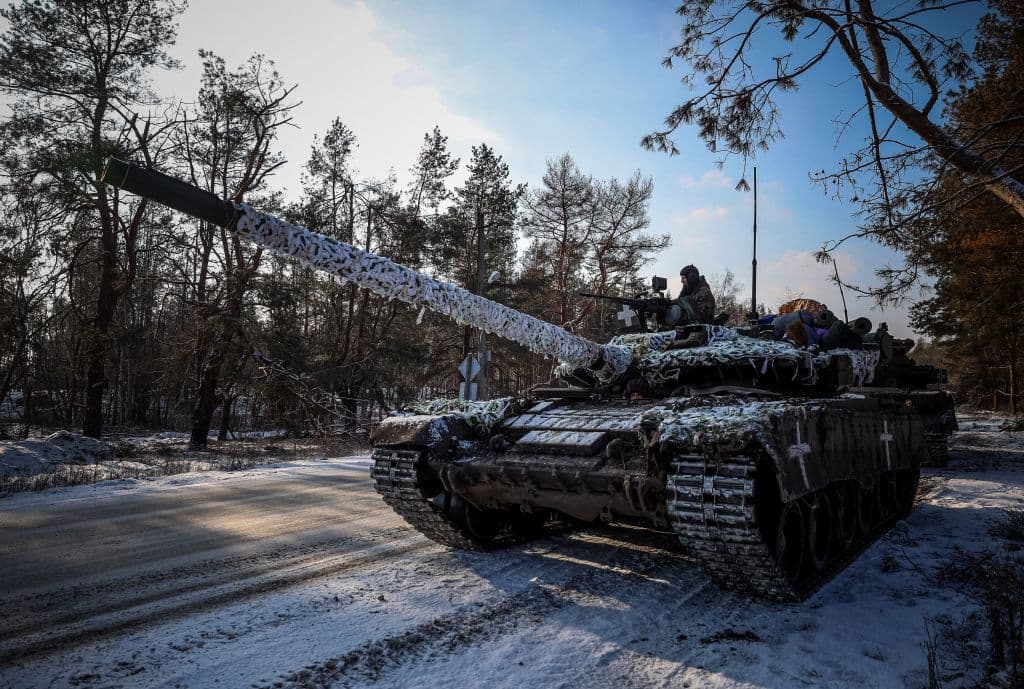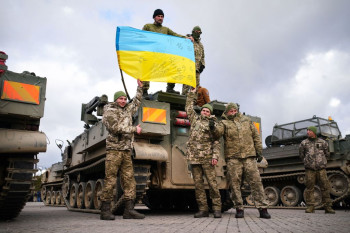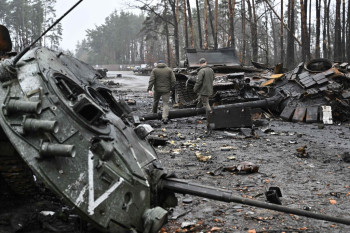Lesia Ogryzko: Unmasking Russian lies amid the ECHR’s recent decision

Editor's Note: The opinions expressed in our op-ed section are those of the authors and do not purport to reflect the views of the Kyiv Independent.
A year ago, on Feb. 21, just three days before Russia launched its full-scale invasion, Russian President Vladimir Putin proclaimed the independence of two Russian-occupied Ukrainian regions – self-proclaimed “Donetsk People’s Republic” and “Luhansk People’s Republic.”
At the time, many rightly feared that this might serve as a pretext for Russia to invade Ukraine further.
Recently, the European Court for Human Rights (ECHR) granted a significant legal decision exposing yet another of the Kremlin’s big lies concerning the occupied territories.
The ECHR determined that Russia has exercised effective control, or “spatial jurisdiction,” over parts of eastern Ukraine since 2014 and is, therefore, responsible for gross violations of human rights in this territory.
The court details with precision how Russia not only fuelled the conflict, but also provided extensive military, political, and financial support to Russian proxies in the region, including by sending military manpower, heavy weaponry, and instruction.
Judging from ECHR rulings on similar cases in other parts of the world, this decision provides that the Russian proxy militias in Donetsk and Luhansk oblasts are paramilitary forces backed by the Russian Federation. From a legal point of view, this essentially means that Russia is responsible for their actions.
Legal significance aside, what does this decision mean politically?
Nine years, the same war
First and foremost, the ruling means that Russia’s aggression is not approaching its first year anniversary, but its ninth.
Back in February 2014, Russia illegally annexed Ukraine’s Crimean Peninsula, after which it conducted a large-scale invasion of Ukraine’s east.
What Russian propaganda called a so-called “historic reunification” with Crimea and “legitimate actions” by alleged “separatists” in eastern Ukraine was a blatant lie. Both actions breached international norms and principles defining the post-WWII order and were the start of the Russia-Ukraine war.
The fact that the West was slow, scared, and indecisive in reacting to these violations is not an excuse to avoid admitting the truth – Russia’s war against Ukraine started in 2014 and should have been dealt with much earlier, without waiting for a full-scale invasion to happen.
It is for this reason that Ukrainians place so much importance on terminology and refer to all conventional, cyber, and information attacks by Russia from 2014 until present as part of the same war.
International conflict, not internal
The ECHR’s decision about Russia’s exercised control over parts of eastern Ukraine also renders another allegation null and void: the so-called domestic nature of the conflict before 2022. The decision declares once and for all that the conflict is international, between Russia and Ukraine.
The absence of any international legal references to the conflict as being between two states turned out to be a gift for Russia’s domestic and international propaganda.
Reports by international organizations, think tanks, scholars, and journalists could not refer to the military actions in Donbas as a Russian offensive. They were bound by terminology such as “non-government-controlled areas” and “armed groups.”
This was heavily exploited by Russia, which falsely portrayed the developments as an “internal conflict” in Ukraine or a “civil war.”
The non-existant ‘people of Donbas’
The ECHR’s decision also counters Russia’s absurd claim that Russian proxies in Donetsk and Luhansk oblasts represent the will of the “people of Donbas” – a false construct from both a historical and ethnological point of view.
It was precisely this narrative that Russia so skillfully promoted domestically and abroad, claiming that the region has a culture, self-perception, and set of political aspirations distinct from the rest of Ukraine.
This claim served its purpose for the Kremlin in February 2022, when Putin said that one of the main reasons for Russia’s full-scale invasion of Ukraine was to allegedly “liberate” and “support” the people in Donbas.
‘Separatism’ made in Russia
The fact that Russian proxies in Donetsk and Luhansk oblasts are paramilitary forces of the Russian Federation leads us to the final conclusion: there would not have been any so-called “separatist” movements if it hadn’t been for Russia’s efforts.
The sheer volume of support given to the Russian proxies speaks to this fact. The ECHR made reference to significant Russian influence on the militants’ military strategy and the provision of weapons and equipment by Moscow that they otherwise would not have been able to acquire.
Finally, Russia’s cross-border artillery attacks, as per the proxies’ requests, and broad political and economic support, also serve as sufficient evidence.
This notion is of immense importance as it demonstrates that practically any territory can be transformed into a so-called “break-away” region provided it has access to the necessary informational, political, economic, and military influence from external sources.
There will always be local collaborators who are ready to trade a country’s territorial integrity for a position in a puppet regime. A local population can be silenced in time and with persistent intimidation and human rights violations. Sufficient international exposure of state propaganda and disinformation campaigns can secure global recognition of these regions as allegedly legitimate representatives of popular will.
Yet, what most Western observers do not know is that this is nothing new.
This Russian-made “separatism” that has unfolded in Ukraine’s east since 2014 is not a new phenomenon, as it has served for decades as a foreign political tool of the Russians.
Attempts to break Ukraine's backbone and identity failed in 2014 and are doomed to fail once again. The civilized world has to reassess its mistakes from the past nine years of Russia's war and do as much as possible to speed up Ukraine's victory.












